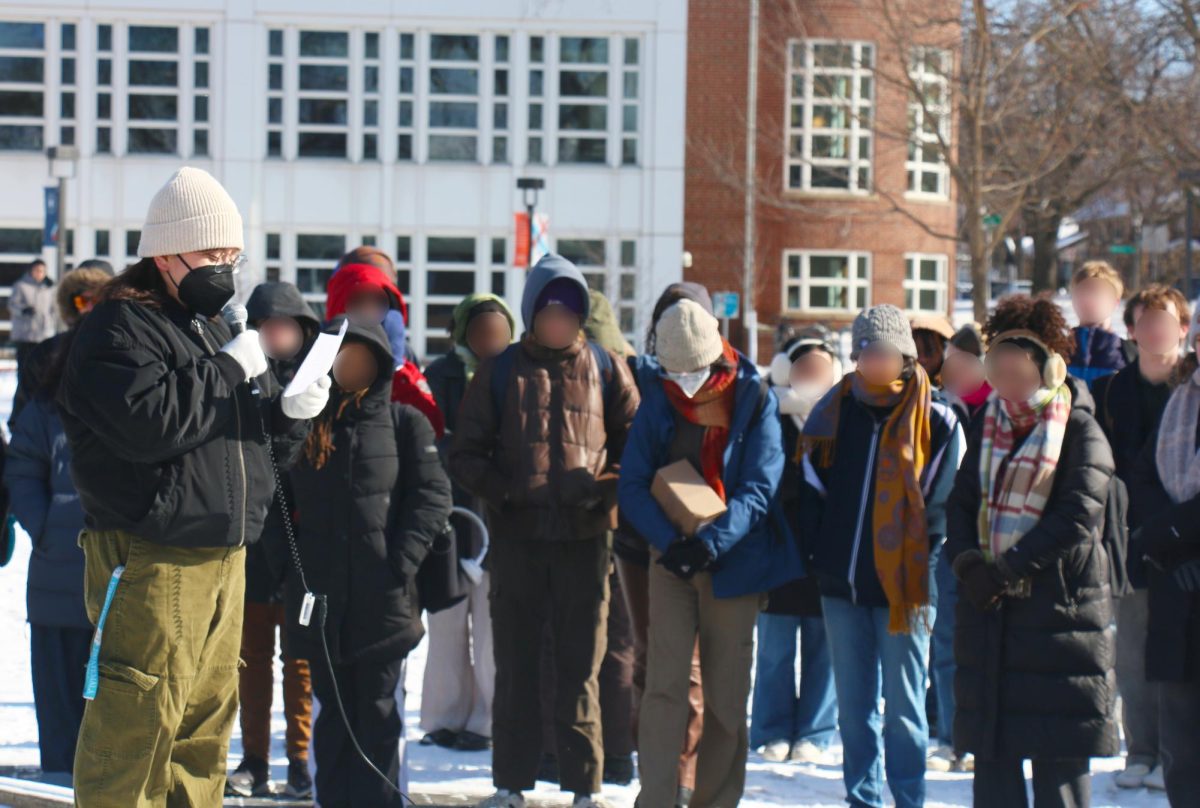Despite the biting cold at noon on Thursday, Feb. 6, 70-80 students, faculty and staff rallied around Macalester’s flagpole to support immigrant and undocumented community members in light of President Donald Trump’s executive orders authorizing sweeping arrests and raids by U.S. Immigration and Customs Enforcement (ICE).
The protest was organized by Minnesota Youth Activist Alliance (MNYAA), a statewide youth advocacy organization, and featured speeches by several Macalester students, as well as speakers from Hamline University and Augsburg University.
“The purpose of the protest was to bring awareness to how Macalester students, college students and those in any Twin Cities college communit[y] can be involved as allies to support their undocumented peers,” Yamalí Rodas Figueroa ’27,* a lead organizer with MNYAA, wrote in an email to The Mac Weekly. “This came after hearing the news that the University of Minnesota (UMN) would be cooperating with ICE, alongside other nationwide colleges. … I’ve said before that the way to resist national, systematically discriminatory policies is by starting from your own communities, organizing them.”
Matté Lopez ’25, co-founder of Macalester’s First-Generation Low-Income Student Union (FSU), explained that she attended the event to express FSU’s solidarity with undocumented students and to share updates surrounding their work regarding support for those students. Last November, FSU sent a list of 11 demands to Macalester administration. Among those demands, one calls for the college to “create a fund that allows undocumented students to have work-study positions, with payment in amounts equivalent to what they would qualify for under federal work-study.”
“At peer institutions, they found a way to make this possible — to pay undocumented students without work authorization — and so I was advocating that Macalester should also find a way to make that possible,” Lopez said. “I was giving people a bit of insight into the responses from the senior leadership team that I’ve gotten thus far when I’ve asked them about this, and I explained that a lot of responses have been centered on ‘it’s difficult, there’s legal issues,’ and … that’s a very sorry excuse. They should figure it out and try harder.”
On Jan. 21, Trump rescinded a long-held policy that prevented ICE agents from entering protected places — including schools, hospitals and places of worship — and arresting migrants without legal status. As immigration enforcement operations now begin to escalate across the country, many undocumented and immigrant community members are left fearful for their safety.
Shortly after Trump’s order on immigration law, the University of Minnesota (UMN) announced that it would comply with federal court orders in the event that ICE agents arrived on its campus.
In response, thousands of UMN-affiliated students, faculty, staff and community members have come together to call on the institution to protect its fellow undocumented and non-citizen community members, with a petition outlining nine demands to prioritize the protection of undocumented students having amassed over 3,000 signatures among the UMN community.
Nearly two weeks after the UMN announcement, Macalester released its own statement regarding protocol surrounding ICE operations on campus. Macalester’s “Immigration Response Guidance” (IRG) can be found on the college’s website and was announced in the Mac Daily on Monday, Feb. 10 by Vice President for Institutional Equity Alina Wong.
“As new federal orders understandably raise uncertainty and concern, our purpose remains unchanged, and we affirm our longstanding values,” the value statement of the IRG read. “We are committed to protecting the privacy, upholding the rights and supporting the flourishing of every member of the Macalester community.”
In an email to The Mac Weekly, Wong elaborated on Macalester’s commitment to protecting students amidst new federal orders and looming uncertainty regarding the presence of ICE on campus.
“Our priorities are to protect the rights of our community members and to support student learning and success,” Wong wrote. “Students seeking support should reach out to Hana Dinku in the Lealtad Suzuki Center for Social Justice or Javier Gutierrez, Dean of Students. Employees seeking support should reach out to Human Resources.”
Additionally, Wong informed The Mac Weekly of recent work from Institutional Equity to protect students whose safety may be at risk.
“We are working with an immigration law firm to offer legal assistance to students with concerns about their legal status, and we are developing additional long-term strategies to support students impacted by federal legislation,” Wong wrote. “Our focus is on individual support and outreach to protect the privacy of our community members.”
The IRG differentiates between public and private spaces on campus, stating that ICE or other law enforcement may enter public areas or spaces on campus. These include the Ruth Stricker Dayton Campus Center common areas, Weyerhaeuser Hall common areas, outdoor walkways, grounds and parking lots. To enter private spaces like residence halls, academic and administrative buildings, the library and the Leonard Center, a valid judicial or administrative warrant is required. Restricted access buildings include any that require keycard access.
A valid judicial warrant must be issued by a judicial court and signed by a judicial officer. An administrative warrant is issued by the Department of Homeland Security and requires permission from Macalester to enter restricted spaces.
The IRG also includes a list of steps in the case that a community member is approached by ICE or other “external entities,” advising individuals to “stay composed” and avoid escalation, refrain from answering any questions and call Public Safety at 651-696-6555.
After informing Public Safety of the location of the encounter with external agents like ICE, an officer will come and refer the agent to the “appropriate designated college official,” according to the IRG. Associate Provost & Chief Data Officer Bethany Miller and Director of Human Resources Deb Ekeren, the appointed officials, “are informed about required warrants and documentation for information requests, as well as the rights and responsibilities of the college.”
According to Lopez, the IRG seemed more reactive than it did a comprehensive resource for support.
“I think it was more like damage control — of them identifying that this is something that people care about and trying to put something out quickly to reassure people — than it was a release of a comprehensively thought-out plan,” Lopez said. “I think the systemic issue at Macalester is there’s not a lot of communication between staff and students. … I feel like students who have mixed statuses or have concerns about this shouldn’t have to be creating space for this dialogue to happen.”
For Rodas-Figueroa, the administration’s response necessitates further action aimed at providing support and resources for undocumented students at Macalester.
“I appreciate the effort to include these resources and reinforce what national immigration organizations have shared,” Rodas Figueroa wrote. “However, I still have questions about what the response of Public Safety will be. Will they allow ICE to arrest students? Will they ask them to leave? Will they refer them somewhere else? I believe the response is lacking any sort of commitment or funding to address the issues at hand.”
“I would like to see the college invite and compensate local immigration organizations and organizers to present Know Your Rights workshops. I also recommend bringing in folks from UndocuProfessionals to support undocumented students’ careers. Additionally, I suggest creating a team from various departments, providing them with guidance, resources and funds to holistically support undocumented folks.”
In addition to long-term commitments and initiatives to provide resources and ensure protection for undocumented students, Lopez reminded community members that expressions of solidarity are not always “flashy” — that behind-the-scenes work, too, is meaningful advocacy.
“I just want to recognize that the demands document [created by FSU] is four years of solidarity,” Lopez said. “A protest is not the only way to show support — our existence is support.”
* Yamalí Rodas Figueroa is a staff writer for The Mac Weekly.












